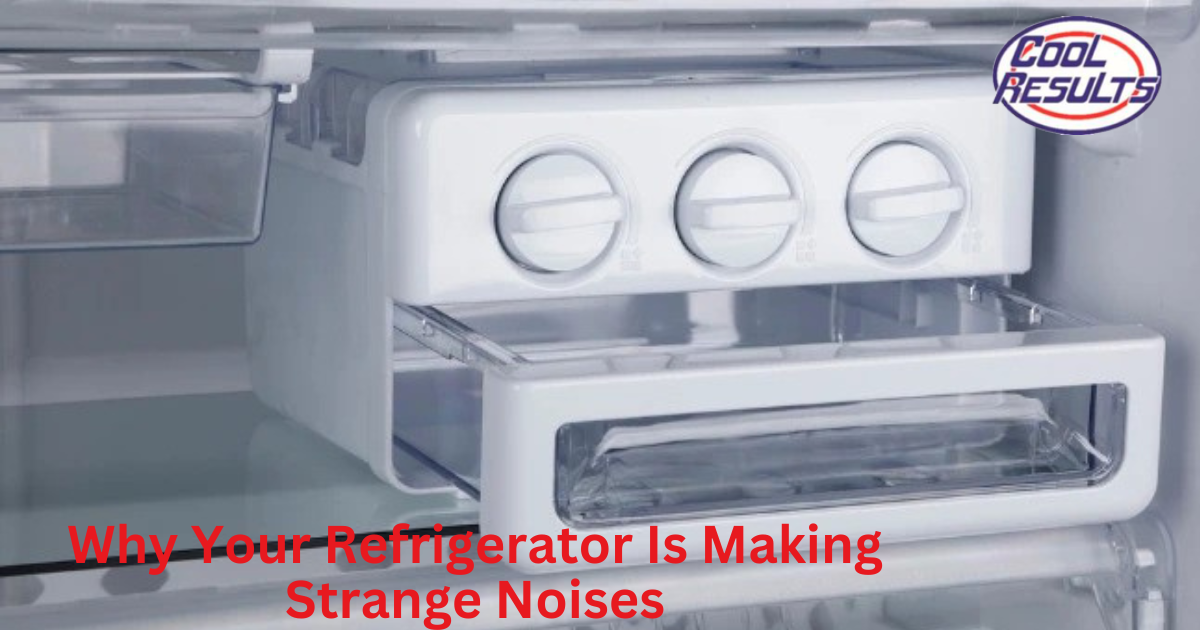Do you hear some strange noises from your refrigerator? It is vital to pay attention to those signals that your refrigerator is trying to tell you. Not all noises will cause significant issues; it is crucial to ensure that you can understand the meaning of each sound to take appropriate actions. This blog will take you through the abnormal refrigerator noises and what the noises mean to ensure your refrigerator’s proper functioning and longevity.
Why Does Refrigerator Make Noise?
There are numerous refrigerator noises, and different factors cause each noise. Here’s a breakdown of why your refrigerator might be making noise:
-
Normal Operational Sounds:
Refrigerators often emit sounds even during their normal operation. Such noises include a gentle humming sound from the compressor, which is responsible for cooling the fridge, or occasional popping noises when the refrigerator is switched on or shut down. These sounds are perfectly normal and indicate that your refrigerator is functioning optimally.
-
Fan Noise:
Refrigerators have fans inside to circulate air and regulate temperature. Mainly, the running fan can cause a typical buzzing sound. Sometimes, debris or ice buildup can cause the fan to make louder or unusual noises. Cleaning or defrosting the refrigerator is often crucial to resolving this issue.
-
Ice Maker:
If your refrigerator has an ice maker, you may hear sounds like water flowing or ice dropping into the ice bin. These sounds are a normal part of the ice-making process and usually nothing to worry about.
-
Defrost Cycle:
Refrigerators may produce a sizzling or hissing sound during the defrost cycle as the ice melts off the evaporator coils. Such fridge noises are normal and help prevent frost buildup, ensuring optimal cooling efficiency.
-
Loose Components:
Occasionally, loose components or items stored inside the refrigerator can cause rattling or vibrating noises. Check for any loose shelves, drawers, or food containers causing the noise, and secure them properly.
-
Refrigerant Flow:
Sometimes, you may hear a gurgling or bubbling noise as refrigerant flows through the coils. This is typically harmless and occurs as the refrigerant absorbs heat inside the refrigerator.
If you notice your fridge making weird noises, it’s necessary to investigate further. While some refrigerator noises are normal, others may indicate underlying issues that require attention. If you’re unsure about the cause of the noise or if it persists despite troubleshooting, it’s best to consult a professional technician for assistance.
Strange Noises That May Cause Potential Issues
Abnormal refrigerator noises indicate potential underlying issues that need attention and you need refrigeration repair. Here are some abnormal noises you might hear and what they could mean:
1. Loud Banging or Clanking Sound:
Potential Causes: Various issues, such as a loose compressor or fan motor, worn-out components, or any loose items inside the refrigerator, can cause these clanking noises.
Suggestions: Look for any of these reasons causing the refrigerator to make noise. If the noise persists, it’s advisable to consult a professional technician to inspect and repair any internal components that may be loose or failing.
2. Loud Rattling Sound:
Potential Causes: These loud rattling noises are often associated with issues related to the fan motor or compressor. Worn-out bearings, belts, or other components might be the cause of such sounds.
Suggestions: Notice closely to identify the noise source, whether from the fan or compressor area. It’s always best to have a technician inspect and take required actions like repairing or replacing the affected components to prevent further damage and ensure proper functioning.
3. Continuous Grinding or Scraping Sound:
Potential Causes: A faulty evaporator motor, debris stuck in the fan blades, or a problematic condenser may cause continuous grinding or scraping noise.
Suggestions: Check the fan blades for any visible damage or have a professional technician examine the fan motor and associated components to determine the cause and perform necessary repairs or replacements.
4. Hissing or Sizzling Sound:
Potential Causes: Hissing or sizzling noises from the refrigerator may be due to refrigerant leaks. This is a serious issue that requires immediate attention, as it can impact the cooling efficiency of the refrigerator and pose health risks.
Suggestions: If you hear hissing or sizzling noises, it’s essential to turn off the refrigerator and unplug it immediately. Contact a professional technician to safely locate and repair the refrigerant leak to prevent further damage and ensure the safe operation of the appliance.
5. Loud Humming Noise:
Potential Causes: The refrigerator making loud humming noise can be caused by various issues, including a malfunctioning compressor, faulty motor, or loose components.
Suggestions: Try to listen carefully, identify the noise source, and inspect the refrigerator for any loose components. If the noise persists, it’s advisable to have a professional technician diagnose and repair the issue to prevent further damage and ensure proper functioning.
6. Clicking or Ticking Sound:
Potential Causes: Electrical problems such as a faulty relay or capacitor may cause this clicking or ticking sound from the refrigerator, as these components are responsible for the flow of electricity to various parts of the fridge.
Suggestions: Listen closely to identify the noise source and inspect the electrical components for any visible signs of damage or malfunction. It’s advisable to have a professional technician to diagnose and repair any electrical issues to ensure the safe operation of the appliance.
If you notice any of these abnormal refrigerator noises, it’s important to pay attention and address them promptly to prevent potential damage and ensure the optimum functionality and longevity of the fridge. If you’re unsure about the cause of the noise or how to fix it, seeking assistance from a qualified technician is advisable.
At Cool Results, we specialize in tackling abnormal refrigerator noises of all makes and models. Our team of skilled technicians is equipped with the knowledge and tools to identify the root cause of the problem and provide efficient solutions.

